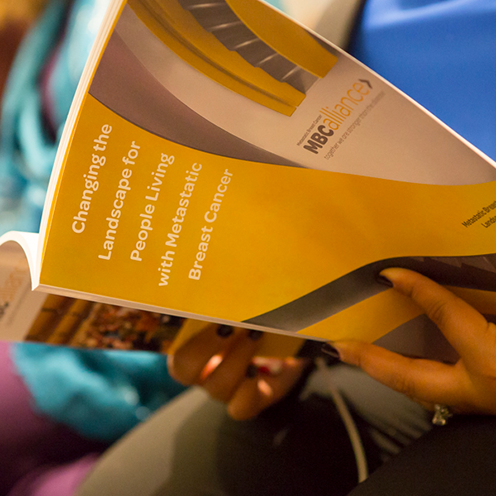Changing the Landscape for People Living with Metastatic Breast Cancer
As its first initiative, the Alliance undertook a landscape analysis to assess gaps, duplication, and opportunities in MBC research, patient information and support services, and public awareness to capitalize on identified opportunities, and identify the ways Alliance members could work together to meet the unique needs of those living with MBC.
MBC Scientific Research
More funds need to be directed to MBC research. MBC-focused research made up only 7% of the $15-billion invested in breast cancer research from 2000 to 2013 by the major governmental and nonprofit funders from North America and the United Kingdom. Specific scientific areas are understudied. The field of MBC research is relatively small. 169 clinical trials testing ‘targeted’ therapies for metastatic breast cancer were identified, addressing 7 common traits shared by all cancers. Opportunities exist to reduce barriers to patient participation in trials and to update trial design to address endpoints important for metastatic breast cancer.
Quality of Life
More needs to be done to meet the needs of patients and families. Patients with metastatic breast cancer have unique emotional, physical and psychosocial needs, many of which are unmet by health care providers and support organizations. There is limited quality of life research conducted on the needs of minority or poor populations living with the disease.
Information & Support Services
Alliance members provide significant support and information to people living with metastatic breast cancer. However, opportunities exist to make information about the disease across agencies more consistent and easily understood, to develop metrics that measure the reach and impact of programs and services, and to reach into underserved communities regardless of socioeconomic status, race, gender, culture or geography.
Epidemiology
Improving care requires documenting the number of metastatic breast cancer patients, how long they live, and how well they respond to treatments. Population-based data are needed on early breast cancer patients who experience a recurrence after early stage diagnosis.
Awareness & Action
A greater understanding of what MBC is and how it differs from early-stage breast cancer is needed among patients, their families, healthcare providers, researchers and the public.



